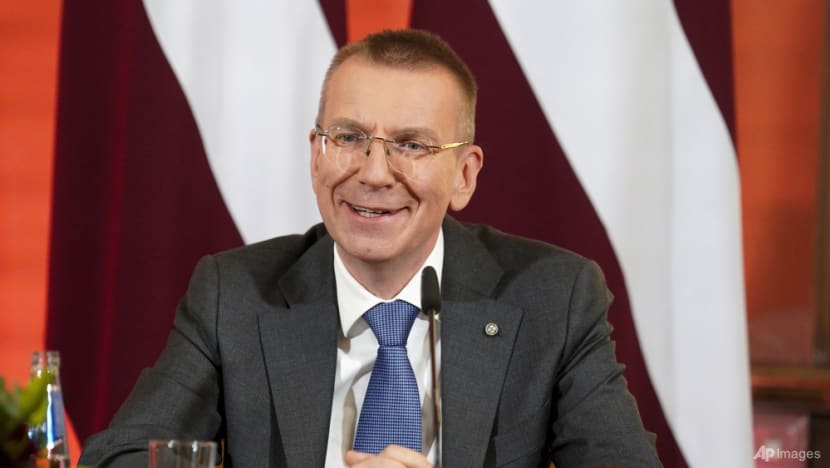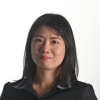Latvia to increase defence spending, urges NATO allies to do the same
Latvian President Edgars Rinkevics spoke to CNA during a wide-ranging interview on the sidelines of the NATO summit in Washington DC.


This audio is generated by an AI tool.
WASHINGTON DC: Latvia’s defence spending is expected to surpass projections this year, its President Edgars Rinkevics said, urging European allies to also increase their military expenditure in order to hit goals set by NATO.
Latvia will spend an estimated 3 per cent of its Gross Domestic Product (GDP) in 2024 to strengthen its defence capabilities, higher than the initial planned budget of 2.4 per cent, Rinkevics told CNA on Wednesday (Jul 10).
Last year, the Baltic state spent more than US$1 billion – almost 2.3 per cent of its GDP – on defence expenditure.
Rinkevics said fellow North Atlantic Treaty Organization (NATO) members need to commit at least 2 per cent of their GDP to defence spending, in line with the bloc’s guideline.
NATO states in 2014 agreed to do so by 2024 to help ensure the alliance’s military readiness. The move to bolster its defence budget came after Russia’s annexation of Crimea in Ukraine’s south, and has been seen as increasingly urgent following Moscow’s full scale invasion of Ukraine in 2022.
However, as of last year, only 10 out of 32 member states – including Latvia – have reached or exceeded the target.
“Let's face it, (even) 2 per cent is not enough. There are discussions about the need to spend at least 2.5 per cent of GDP in the future,” Rinkevics told CNA on the sidelines of the ongoing NATO summit in Washington DC.
Once a member of the Soviet Union, Latvia shares its eastern border with Russia and has been a NATO member for two decades.
ON UKRAINE
Ukraine is at the top of the agenda at the NATO summit. The three-day meeting opened on Tuesday with a forceful speech by United States President Joe Biden, who promised to defend the war-ravaged nation against Russia’s invasion.
NATO leaders plan to pledge more arms and ammunition, as well as reassure Kyiv of their ongoing support.
Rinkevics said it is critical for NATO members to continue to aid Ukraine, calling on nations to lift restrictions on the use of weapons provided to Kyiv.
Amid concerns that allowing Kyiv to use Western-supplied weapons on Russian territories will escalate the conflict, countries have restricted their use to military targets inside Ukraine.
Some such limitations on shorter-range weapons have since been lifted as Russia’s forces advanced in recent weeks.
However, this still puts Ukrainian cities at risk of Russian aircraft that fly in from military bases hundreds of miles inside Russia, firing weapons and dropping bombs. Kyiv has pleaded for fewer restrictions, especially on long-range weapons.
Rinkevics said Ukraine has become a “litmus test” for nations regarding the world order.
“(If countries) can get away with launching war, grabbing territory and committing atrocities, then the international law and order, as we know it, is going to disappear,” he said.
ON ASIA
Amid Russia and China’s ‘no-limits’ relationship, NATO is looking to deepen ties with its Indo-Pacific allies.
Leaders of Japan, South Korea, Australia and New Zealand will attend the Washington summit despite not being part of the military alliance.
Rinkevics said it is crucial for NATO to continue working with Indo-Pacific partners that share common interests and similar values.
He expressed disappointment that China – which he called an "important" voice in the global order – has not used its influence to pressure Russia to stop the war.
“I believe if there was a very strong message from China to Russia: ‘Stop it’, if it (Russia) isn’t getting support … most probably Russia would not be able to continue the war. And unfortunately, we don't see that,” he added.
ON HUNGARY
Last month, Hungary took over the European Union's rotating presidency for six months.
Hungarian Prime Minister Viktor Orban has since visited Moscow for talks with Russian President Vladimir Putin. He also travelled to Beijing to meet Chinese President Xi Jinping on a trip he branded a Ukraine “peace mission”.
Rinkevics said the EU presidency is largely a ceremonial role, and Orban’s visits do not represent NATO or change the alliance’s position on Ukraine.
Instead, he said they should be viewed as bilateral diplomatic efforts by Hungary, not the bloc.
Rinkevics added that there were no “positive results” stemming from Orban’s visits, pointing to Monday’s deadly missile strikes by Russia on a Ukrainian children’s hospital.
“Frankly, Russia and Putin don’t care about peace initiatives at this point … Also, nobody has asked (Orban) for that peace mission,” he said.















